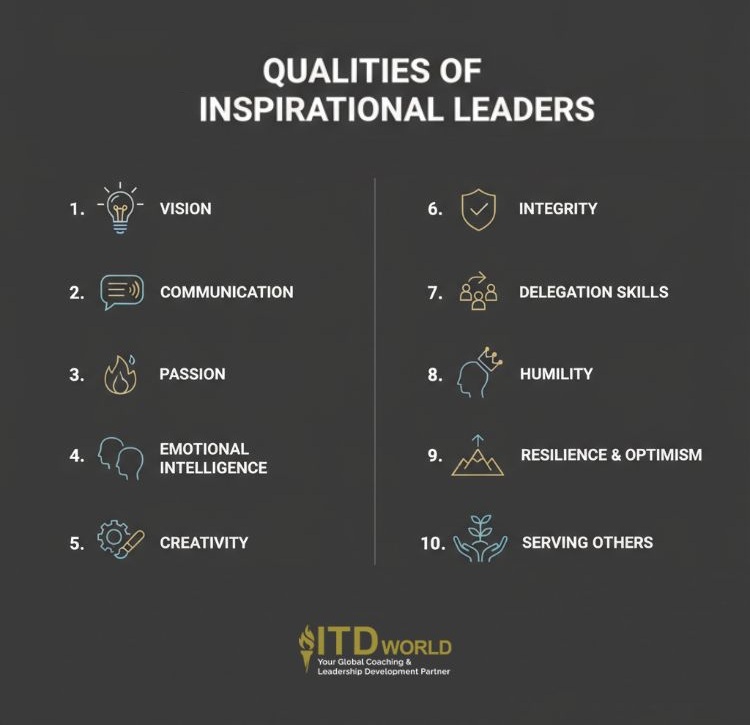Discover the transformative power of inspirational leadership. Learn how to ignite passion & drive motivation for breakthrough results!
Given the fast-paced and ever-evolving landscape of today’s workplaces, leadership is no longer just about authority and decision-making. It’s about inspiring and motivating team members to bring out their best selves to the table. Inspirational leadership offers a profound shift from traditional management approaches – when employees are driven by a sense of meaning and inspired by their leaders, the results are bound to be truly remarkable.
|
Author: Jonathan M. Pham |
Highlights
- Inspirational leadership style emphasizes fostering a shared vision, building trust, valuing individuals, prioritizing self-development, and creating a supportive environment for personal and collective growth. Those who practice this philosophy empower their followers through vision, values, and charisma – rather than relying on authority, rewards, and punishments to drive performance. As such, their management is often linked to enhanced productivity, engagement, employee commitment, innovation, performance, and reduced turnover.
- Inspirational leaders typically demonstrate qualities such as vision, communication, passion, emotional intelligence, creativity, integrity, delegation skills, humility, resilience, optimism, and a servant mindset.
- Practicing inspirational leadership requires one to be authentic, cultivate curiosity, embrace empathy, show respect and gratitude, invest in communication skills, and – above all – be coachable and open to feedback from others.
What is Inspirational Leadership?
Inspirational leadership is a dynamic, evolving philosophy that adapts to the unique needs and aspirations of individuals and teams. It is a leadership style that transcends the ordinary, transforming organizations into thriving ecosystems – where both personal and collective success become attainable realities.
At its core, inspirational leadership is a style of guidance that transcends mere authority, delving deep into the realms of motivation, encouragement, and empowerment. It seeks to elevate both the individual and collective aspirations of a group of people, steering them toward not only achieving common objectives – but also nurturing their personal and professional growth.
Inspirational leaders are akin to catalysts – their influence permeates the very fabric of an organization. Their primary objective is to attain corporate success – while at the same time facilitating the development of each team member within the shared journey.
Below are a few key tenets that set this approach apart from conventional leadership models:
- Creating a shared vision: At the heart of inspirational leadership lies the ability to craft and articulate a compelling vision – which later becomes a guiding star that instills in team members a sense of purpose, a reason to invest their time and energy wholeheartedly.
- Fostering belief and trust: Inspirational leaders are masterful cultivators of confidence within others – this trust is the bedrock upon which high-performing teams are built.
- Valuing & respecting each individual: Every team member is considered more than just a cog in the organizational machine; they are valued contributors. Inspirational leaders foster a culture of inclusivity and respect, ensuring that every voice is heard, every opinion matters, and every person feels seen and appreciated.
- Prioritizing self-development: Another distinct feature that sets them apart is their unwavering commitment to the development of their team – based on which they are equipped to empower their followers to excel in their careers and realize their full potential.
- Creating a supportive environment: Inspirational leaders are the architects of positive work environments – in which employees are more likely to give their best, knowing that their contributions are valued and recognized.
- Investing in opportunities for growth: A hallmark of inspirational leadership is the dedication to providing opportunities for learning – they invest in their team’s growth by offering training, mentorship, and avenues for skill enhancement, thus ensuring that their people continue to evolve and thrive.

Leaders Who Inspire vs Those Who Motivate
Leaders who inspire are the torchbearers of vision, values, and charisma. They rely on these attributes to forge deep connections with their followers, creating a tapestry of shared purpose that binds the team together. Their leadership is not rooted in authority or the promise of material rewards; instead, it emanates from an intrinsic desire to uplift and empower others.
- Stimulating critical thinking: Inspirational leaders thrive on stimulating the minds of their followers. They challenge the status quo – while at the same time encouraging critical thinking and self-discovery.
- Fostering collaboration: These individuals cultivate a positive and collaborative culture where trust, respect, and open communication flourish. It’s a place where everyone feels valued, and individual contributions coalesce into a harmonious symphony of collective achievement.
- Achieving extraordinary results: Their influence extends beyond the confines of the workplace, benefiting themselves, their immediate followers, and the society at large. They are catalysts for positive change, igniting sparks of motivation that have far-reaching consequences.
On the other hand, for those who only motivate, their modus operandi revolves around the use of authority, rewards, and punishments to shape and control their followers’ behavior. While effective in certain situations, this approach differs significantly from inspirational leadership in both its nature and long-term implications.
- Clear instructions & expectations: They define goals and closely monitor and evaluate performance, ensuring adherence to predefined benchmarks. This structured approach is designed to drive immediate results and meet organizational objectives.
- Competitive culture: Motivational leaders often promote a competitive and results-oriented culture. The focus is primarily on achieving individual and organizational goals, with a strong emphasis on productivity and efficiency. Rewards such as bonuses, promotions, or praise serve as incentives, while disciplinary action or layoffs may loom as potential consequences for underperformance.
- Short-term effectiveness: The promise of rewards and the threat of punishment may drive immediate action and compliance. However, the sustainability of such an approach in the long term is a subject of debate – as followers may become dependent on external incentives, potentially diminishing their intrinsic motivation over time.
| Aspect | Leaders Who Inspire | Leaders Who Motivate |
|---|---|---|
| Foundation | Vision, values, and charisma | Authority, rewards, and punishments |
| Connection | Forge deep connections | Transactional, less personal |
| Approach to Thinking | Stimulate critical thinking | Define clear goals and expectations |
| Culture | Foster a collaborative culture | Promote a competitive culture |
| Long-term Impact | Achieve extraordinary results | Short-term effectiveness |
| Incentives | Intrinsic motivation | External rewards and consequences |
Benefits of Inspirational Leadership in the Workplace
- Increased productivity
Various research has proven that teams led by inspirational leaders often surpass their goals. By aligning their work with the values of their team, and encouraging ambitious – yet realistic goals, they empower their teams to consistently meet and exceed targets, driving overall productivity to new heights.
- Enhanced engagement
Inspirational leaders are architects of purpose. They infuse their teams with a profound sense of meaning and passion, igniting an intrinsic motivation that propels each member toward their tasks with fervor. Their enthusiasm instills a sense of genuine care for their team’s progress and well-being – thereby resulting in increased engagement as team members find deeper value and purpose in their work.
- Committed employees
Observing managers who model a strong work ethic and unwavering commitment has been shown to push employees to aspire to the same level of dedication. People are more inclined to stay with an organization when they are led by exceptional individuals who are there to “hold the torch” for them.
- Catalyst for change
Inspirational leaders cultivate an environment where creative thinking, risk-taking, and experimentation are allowed to thrive. Their fearless approach to problem-solving leads to the emergence of novel and groundbreaking solutions – which become the foundation for transformative change within the organization.
- Escalated learning & performance
Inspirational leaders are relentless champions of personal and professional growth. They challenge their followers to think critically, and to uncover their own leadership potential. By sharing their knowledge and skills generously, providing constructive feedback, and offering recognition for achievements, they contribute to fostering a culture of continuous learning and unparalleled performance.
- Positive & collaborative culture
Under their guidance, trust, respect, and open communication flourish. This nurturing environment enhances morale, engagement, and commitment among team members. It also paves the way for a culture of innovation and change, where new ideas and solutions are encouraged and celebrated.
- Reduced turnover
Employees are more likely to remain loyal to a company led by inspirational leaders. This loyalty stems from the creation of a positive work environment where individuals feel valued and respected. Aside from saving on recruitment costs, reduced turnover also helps preserve institutional knowledge and contributes to a more stable and cohesive workforce.
Inspirational Leadership Examples
What sets inspirational leaders apart from the rest is their remarkable ability to envision a better future and convey that vision in a way that captivates hearts and minds. They embody their convictions, infusing their work with boundless passion and unwavering commitment.
Here, we explore some iconic figures whose stories serve as beacons of hope and guidance for inspiring leaders of today
- Mahatma Gandhi: As the leader of the Indian independence movement, Gandhi championed non-violence and civil disobedience as potent tools for achieving freedom and dignity. His resolute commitment to peace inspired millions in India and across the globe to resist oppression and injustice. Gandhi’s ability to convey a clear vision of a free and just India, coupled with his unwavering passion for his cause, left an indelible mark on the world.
- Martin Luther King Jr.: In his quest for civil rights and social justice, Luther King has fearlessly advocated for racial equality and human rights through peaceful protests and eloquent speeches. His ability to articulate a vision of a world free from discrimination and oppression galvanized a movement and led to monumental legislative changes.
- Oprah Winfrey: Rising from a background of poverty, abuse, and discrimination, Oprah became a media mogul, philanthropist, and cultural icon. Through her talk show, book club, media network, and foundation, she empowered millions to overcome adversity and pursue their best lives.
- Steve Jobs: The late co-founder of Apple exemplified inspirational leadership in the realm of technology and innovation. His unbridled creativity and passion revolutionized personal computing, music, animation, and mobile devices. Jobs’ relentless pursuit of excellence, coupled with his ability to communicate a future where technology enhanced human lives, inspired not only his team but also the entire tech industry and consumers worldwide.
- Nelson Mandela: Mandela’s leadership was instrumental in the transformation of South Africa from apartheid to a fully representative democracy. His visionary leadership has become a symbol of hope and inspiration for those fighting for equality globally.

Key Qualities of Inspirational Leadership
-
Vision
Inspirational leaders are known for possessing a clear and compelling vision of the future – which is shared with their followers to align their work with the values and purpose of the team. This vision becomes a guiding star, inspiring everyone to pursue a common mission, and instilling purpose into their daily endeavors.
-
Communication
Effective communication lies at the heart of inspirational leadership. They convey their vision effectively and persuasively, utilizing words, actions, and emotions. Additionally, they are also active listeners who attentively engage with others to provide feedback and recognition – thereby nurturing an environment of open and honest dialogue.
-
Passion
Another distinct characteristic is their unwavering passion for what they do and why they do it. They radiate enthusiasm, confidence, and optimism, infusing their work with boundless energy and excitement. This fervor becomes contagious, motivating and energizing their followers.
-
Emotional intelligence
Emotional intelligence is a hallmark of inspirational leadership. These leaders possess a deep understanding of human emotions and needs. They empathize with their team members, offering genuine support for their personal and professional development. As a result, their presence contributes to an atmosphere where individuals feel seen, heard, and valued.
-
Creativity
Inspirational leaders are catalysts for creative and critical thinking. They challenge their followers to explore new horizons, both in their work and personal growth. By stimulating innovation and fostering a culture of learning and experimentation, they inspire their teams to push the boundaries of what’s possible.
-
Integrity
Integrity is non-negotiable for such people – they consistently act with honesty, authenticity, and transparency. Their high ethical standards and unwavering commitment to their values serve as beacons of trust and respect. They lead by example, demonstrating accountability and integrity in all their actions.
-
Delegation skills
Understanding the power of delegation, they provide clear and concise instructions to their team members while equipping them with the necessary resources and support to succeed. Effective delegation is what empowers the team to take ownership of their work.
-
Humility
Humility is another defining trait of inspirational leaders. They are not afraid to admit their mistakes and readily acknowledge that they don’t have all the answers. Being open to learning from others fosters an environment where humility is celebrated as a pathway to growth.
-
Resilience & Optimism
Inspirational leaders display resilience in the face of adversity. They bounce back from setbacks and continue to pursue their goals with unwavering determination. Their ability to navigate challenges inspires their team members to persevere through difficult times.
In addition, they wholeheartedly believe in the potential of their team and their ability to achieve their goals. Their positive outlook is contagious, motivating their followers to approach challenges with confidence and a can-do attitude.
Read more: 5Fs of Leadership Resilience to Thrive in Challenging Times
-
Serving others
Inspirational leaders are known for their passion for servant leadership – as a result, they constantly strive to place a strong emphasis on the well-being of team members. When selflessly serving others, they contribute to establishing a culture of support and collaboration, where everyone’s success is a shared endeavor.
Read more: Executive Presence – Key Strategies for Professional Success

How to Practice Inspirational Leadership
Now that we have gone through the theory & best practices, let’s explore tips on how to become an inspiring leader:
-
Be authentic & honest
Authenticity is not just about being genuine but also about being transparent. Communicate your vision and purpose with clarity and sincerity, using words, actions, and emotions to convey your commitment to your mission. Be a role model that your followers can look up to and respect. Align your actions with your core values, and let them guide your decisions and interactions.
-
Cultivate curiosity
Inspirational leaders are perpetual learners. For this reason, an open mindset is crucial to keep you open to new ideas and perspectives.
Seek feedback and actively work on self-improvement. Challenge yourself to expand your horizons and encourage your followers to think creatively – so as to foster an environment of continuous growth.
-
Embrace empathy
As mentioned, empathy is a cornerstone of effective leadership – as a result, make sure to connect with your followers on a personal level, trying to understand their needs, emotions, and motivations. Additionally, encourage a positive and collaborative culture where morale, engagement, and commitment thrive.
-
Show respect & gratitude
Honor the diversity and uniqueness of your followers, valuing their contributions and achievements. Build trust and rapport by being accountable and transparent in your actions. Express genuine gratitude and appreciation for your team members, recognizing their efforts and celebrating their successes.
-
Hone your communication skills
In order to master the art of communication, you may want to utilize storytelling and other engaging techniques to captivate your audience. Communicate your vision and goals in a way that inspires and motivates, leaving a lasting impact on your followers.
-
Be coachable & open to feedback
Nobody is immune to mistakes or change. Hence, you must learn to admit your errors and be receptive to learning from others. Embrace feedback as a valuable tool for growth – and be willing to evolve and adapt, demonstrating that humility and a willingness to change are integral parts of your leadership journey.
Read more: 12 Golden Leadership Principles for Attaining Excellence

Inspirational Leadership Self-Appraisal Comments
For those who would like to tread the path of inspiring people, here are some self-evaluation phrases to “fuel yourself” and make sure that you are heading the right way:
- I am a leader who inspires others to achieve their full potential.
- I create a positive and supportive work environment where everyone feels valued and respected.
- I am passionate about my work and I am always eager to learn and grow.
- I am a clear and effective communicator who is able to articulate my vision and goals to others.
- I am a strategic thinker who is able to develop and implement innovative solutions to challenges.
- I am a decisive leader who is not afraid to take risks.
- I am a team player who is always willing to help others succeed.
- I am a role model for others and I strive to live my life with integrity and authenticity.
- etc.
More specific examples:
- I am proud of the fact that my team has consistently exceeded expectations over the past year. This is due in large part to my ability to create a culture of innovation and collaboration.
- I am passionate about developing my team members and helping them reach their full potential. I am constantly providing feedback and coaching, and I am always looking for new opportunities to help them grow.
- I am not afraid to challenge the status quo and think outside the box. I am always looking for new and better ways to do things.
- I am a strong advocate for my team and I am always fighting for their best interests. I am also a strong advocate for diversity and inclusion in the workplace.
- I am committed to making a positive impact on the world and I am always looking for ways to use my leadership skills to make a difference.
Read more: Self Leadership – The Art of Leading from Within

Inspirational Leadership Quotes for Managers
The most powerful leadership tool you have is your own personal example.
John Wooden
The key to successful leadership today is influence, not authority.
Ken Blanchard
The challenge of leadership is to be strong, but not rude; be kind, but not weak; be bold, but not bully; be thoughtful, but not lazy; be humble, but not timid; be proud, but not arrogant; have humor, but without folly.
Jim Rohn
Leadership is the art of giving people a platform for spreading ideas that work.
Seth Godin
A leader is best when people barely know he exists, when his work is done, his aim fulfilled, they will say: we did it ourselves.
Lao Tzu
Inspirational Leadership Videos
The Laws of Leadership & Teamwork – Part 1 (by Dr. Peter Chee & John C. Maxwell)
Part 2
Part 3
Inspirational Leadership Books
- Adaptive Leadership: the Heifetz Collection – by Alexander Grashow, Marty Linsky, and Ronald Heifetz
- Leaders Eat Last by Simon Sinek draws inspiration from military principles and shows how putting your team’s needs before your own can foster trust, loyalty, and excellence.
- The 21 Irrefutable Laws of Leadership by John C. Maxwell outlines clear guidelines and best practices for leaders to follow to maximize their influence and achieve a common vision.
- Dare to Lead by Brené Brown teaches leaders how to cultivate courage, vulnerability, empathy, and connection in their teams and organizations.
Read more: Motivational Quotes for Employees From Managers – Toolkit to Inspire Your Team
How Coaching Can Help You Become an Inspiring Leader
In the journey toward becoming an inspiring leader, coaching serves as a valuable compass, guiding you toward honing your skills, empowering your team, and broadening your perspective:
- Developing self-awareness: Coaching delves deep into self-awareness, allowing you to gain profound insights into your abilities and how to harness them to achieve your goals. Through coaching, you are equipped to better understand your strengths, weaknesses, and areas for growth – based on which you may learn to communicate more effectively, problem-solve more creatively, and manage your time more efficiently.
- Enhancing communication skills: Inspirational leaders are known for demonstrating excellence in communication, both verbally and in writing. A coach can fine-tune your communication abilities, helping you convey your vision and goals with clarity and impact. Effective communication is pivotal in inspiring others to follow your lead, and coaching can sharpen this vital skill.
- Mastering delegation skills: Delegation is a cornerstone of empowering your team. A coach can teach you the art of delegating tasks effectively while facilitating team members to make decisions.
- Developing emotional intelligence: Inspirational leaders are attuned to emotions, both their own and those of others. A coach can help you cultivate emotional intelligence, enabling you to navigate the complex terrain of human emotions. Building rapport with your followers and creating a positive, supportive work environment becomes second nature with enhanced emotional intelligence.
- Empowering yourself and the team: Coaching techniques, such as asking open-ended questions, active listening, and providing constructive feedback, are powerful tools for empowering yourself and your team. These techniques foster trust, accountability, and collaboration among team members. They also inspire your team to acquire new skills, embrace fresh challenges, and grow professionally.
- Gaining a fresh perspective: Coaching introduces an external perspective, allowing you to see situations from different angles and discover new opportunities. By tapping into the experiences and insights of other successful leaders and the feedback and suggestions of your coach, you broaden your horizons and expand your leadership toolkit.
In essence, coaching is a transformative tool that propels you toward becoming an inspiring leader who motivates and enables others to perform at their best. It’s a journey of self-discovery, skill refinement, and continuous growth. If you’re eager to learn more about coaching and how it can benefit you and your organization, consider exploring ITD World’s ICF-certified professional coaching certifications for a deeper understanding of this powerful leadership resource!
Read more: Executive Coaching for Sustainable Results

Final Thoughts
To become an inspiring leader is to embark on a path of self-discovery, continuous growth, and unwavering commitment to those you lead. It is a quest to elevate the potential of every individual within your sphere of influence. As you strive to adopt an inspirational leadership approach, remember that your legacy is not just in the goals you achieve, but in the lives you touch, the journeys you inspire, and the transformative impact you leave behind.
Other resources you might be interested in:
- Leadership Branding: Crafting an Inspiring Personal Identity
- Situational Leadership: Guide to Implementation
- Weak Leadership: How It Undermines Success
- Transformational Leadership: How to Inspire Change & Growth
- Love Leadership: More Than an Abstract Philosophical Idea

